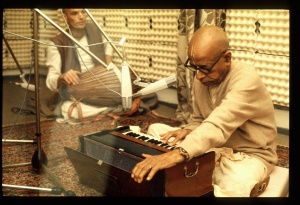CC Adi 4.135

A.C. Bhaktivedanta Swami Prabhupada
TEXT 135
kabhu yadi ei premāra ha-iye āśraya
tabe ei premānandera anubhava haya
SYNONYMS
kabhu—sometime; yadi—if; ei—this; premāra—of the love; ha-iye—I become; āśraya—the abode; tabe—then; ei—this; prema-ānandera—of the joy of love; anubhava—experience; haya—there is.
TRANSLATION
“If sometime I can be the abode of that love, only then may I taste its joy.”
PURPORT
Viṣaya and āśraya are two very significant words relating to the reciprocation between Kṛṣṇa and His devotee. The devotee is called the āśraya, and his beloved, Kṛṣṇa, is the viṣaya. Different ingredients are involved in the exchange of love between the āśraya and viṣaya, which are known as vibhāva, anubhāva, sāttvika and vyabhicārī. Vibhāva is divided into the two categories ālambana and uddīpana. Ālambana may be further divided into āśraya and viṣaya. In the loving affairs of Rādhā and Kṛṣṇa, Rādhārāṇī is the āśraya feature and Kṛṣṇa the viṣaya. The transcendental consciousness of the Lord tells Him, “I am Kṛṣṇa, and I experience pleasure as the viṣaya. The pleasure enjoyed by Rādhārāṇī, the āśraya, is many times greater than the pleasure I feel.” Therefore, to feel the pleasure of the āśraya category, Lord Kṛṣṇa appeared as Śrī Caitanya Mahāprabhu.